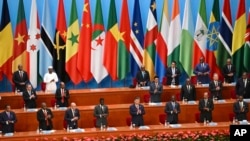Fifty African leaders, including 20 heads of states, attended an annual summit in China’s capital, Beijing, seeking quicker financial solutions to the growing debt crisis, Reuters reported.
The heads of the African nations facing economic and financial crisis due to their debt to China — Angola, Ethiopia, Kenya and Zambia — also participated in the meeting.
Addressing the forum, Chinese President Xi Jinping claimed that “the China-Africa relationship is now at its best in history,” pledging to invest nearly $51 billion and create a million new jobs across Africa in the next three years.
Yet Beijing failed to provide the highly sought after debt relief to the African nations.
China has long faced criticism for what experts call “debt trap diplomacy,” along with accusations of increased illegal trade and a worsening human rights situation in the African countries.
Pro-China experts like Fikrejesus Amahazion, an educator and research analyst at the Eritrean Center for Strategic Studies in Asmara, dispute the allegations, claiming that the West, including the United States, “target” China with “malicious propaganda and slander under the guise of concern for Africa.”
Amahazion told China Says, a state media company that focuses on China's foreign affairs, that Beijing is out to help Africa fight poverty.
“China and its positive constructive relationship with Africa has delivered myriad tangible benefits to both sides,” he said.
That is misleading.
Through its “debt trap diplomacy,” China became the major shareholder controlling most of Africa’s natural resources, infrastructure and other assets. Beijing-owned businesses in Africa practice the worst forms of child labor, fund violent insurgency, sustain corruption, illegal trade and money laundering.
Amahazion failed to mention that at least 40,000 children, some as young as six, are forced to work in cobalt mines in the Democratic Republic of Congo, which are 80% owned by Chinese government companies.
The U.S. Department of Labor said in a 2023 report that the DRC practices the “worst forms of child labor,” especially in the mining industry.
During a hearing last November titled “From Cobalt to Cars: How China Exploits Child and Forced Labor in Congo,” the first witness accounts told the Congressional-Executive Commission on China how children are exploited to work in Chinese-owned mines.
Some of the major mine owners in the DRC include the CMOC Group, which holds an 80% stake in Tenke Fungurume, one of the largest reserves and highest-grade copper-cobalt mines in the world; Wanbao Mining, a subsidiary of state-owned Chinese military supplier Norinco; and Jinchuan Group International Resources, among others.
The U.S. Environmental Investigation Agency reported in May, based on a multiyear investigation, that China played a key role in the illegal transportation of 500,000 tons of timber per year on average from Mozambique to China since 2017. The funds from this illegal trade are partially used to finance violent insurgent groups, and promote systematic corruption and money laundering, the report said.
There is also abundant evidence of China’s use of “debt trap diplomacy” to plunder Africa's resources and other assets.
While extending credit to poor African countries that are unable to repay the loans, China takes collateral in the form of natural resources, infrastructure projects and other assets.
Such concessions allow China to take ownership of the collateral in case of a default.
In 2018, when the Zambian government turned to China for a $40,000 loan to upgrade state broadcaster ZNBC, Chinese StarTimes, which has close links to the Chinese government, was awarded 60% shares in exchange for the loan.
The Zambian government now owns only 40% of ZNBC.
With Zambia being Africa’s biggest copper producer, Chinese companies own 88% of its mining fields.
Last July, JCHX Mining, a Shanghai-listed mining services and contracting company, acquired 80% ownership of Lubambe Mine in Copperbelt, the largest underground mine in Zambia. Zambia's state mining investment arm, ZCCM Investments Holdings, owns the remaining 20%.
Zambia owes China at least $6.1 billion and in 2020 became the first defaulter on a Chinese loan after failing to pay a $42 million bond payment.
Kenya, with $6.7 billion in Chinese debt, leads the list of African nations indebted to China, facing a financial and economic crisis due to the Chinese loan burden.
Generation-Z Kenyans protested for two months this summer, forcing the government to withdraw a financial bill that would have imposed high taxes on essential commodities for the government to pay the accumulated Chinese debts.





